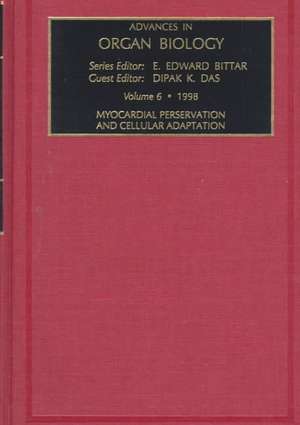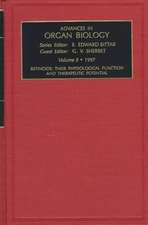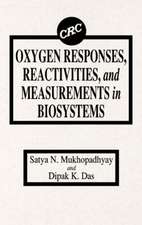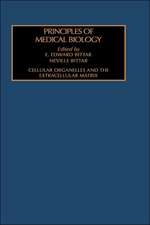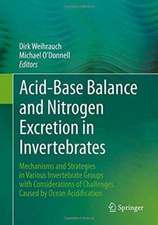Myocardial Preservation and Cellular Adaptation: Advances in Organ Biology, cartea 6
Editat de D.K. Dasen Limba Engleză Hardback – 17 dec 1998
The heart possesses remarkable ability to adapt itself against any stressful situation by increasing resistance to the adverse consequences. Stress composes the foundation of many degenerative heart diseases including atherosclerosis, spasm, thrombosis, cardiomyopathy, and congestive heart failure. Based on the concept that excessive stress may play a crucial role in the pathogenesis of ischemic heart disease, attempts were made to design methods for preventing of myocardial injury. Creation of stress reactions by repeated ischemia and reperfusion or subjecting the hearts to heat or oxidative stress enables them to meet the future stress challenge. Repeated stress exposures adapt the heart to withstand more severe stress reactions probably by upregulating the cellular defense and direct accumulation of intracellular mediators, which presumably constitute the material basis of increased adaptation to stress. Thus, the powerful cardioprotective effect of adaptation is likely to originate at the cellular and molecular levels that compose fundamental processes in the prophylaxis of such diseases.
Volume six of the Advances in Organ Biology series contains state-of-the-art reviews on myocardial preservation and cellular adaptation from the leading authorities in this subject.
Preț: 716.80 lei
Preț vechi: 981.93 lei
-27% Nou
Puncte Express: 1075
Preț estimativ în valută:
137.20€ • 149.08$ • 115.33£
137.20€ • 149.08$ • 115.33£
Carte tipărită la comandă
Livrare economică 21 aprilie-05 mai
Preluare comenzi: 021 569.72.76
Specificații
ISBN-13: 9780762303915
ISBN-10: 0762303913
Pagini: 274
Dimensiuni: 156 x 234 x 18 mm
Greutate: 0.59 kg
Editura: ELSEVIER SCIENCE
Seria Advances in Organ Biology
ISBN-10: 0762303913
Pagini: 274
Dimensiuni: 156 x 234 x 18 mm
Greutate: 0.59 kg
Editura: ELSEVIER SCIENCE
Seria Advances in Organ Biology
Cuprins
Preface (D.K. Das). Preconditioning Induces both Immediate and Delayed Protection against Arrhythmias Resulting from Ischemia and Reperfusion (J.R. Parratt and A. Vegh). Myocardial Protection by Brief Ischemic and Nonischemic Stress (P.D. Verdouw, B.C.G. Gho, and M.A. van den Doel). Cardiac Adaptation to Chronic Hypoxia (B. Ostadal, I. Ostadalova, F. Kolar, V. Pelouch, and N.S. Dhalla). Analysis of Altered Gene Expression during Ischemic Preconditioning (N. Maulik). Myocardial Preconditioning Via ATP-Sensitive Potassium Channels Interactions with Adenosine (G.J. Gross, T. Mizumura, K. Nithipatikom, and D.A. Mei). Ischemic Preconditioning: Role of Multiple Kinases in Signal Amplification and Modulation (D.K. Das). Early and Lat Preconditioning against Myocardial Stunning: Pathogenesis and Pathophysiology (J.A. Auchampach, X. Tang, Y. Qiu, P. Ping, and R. Bolli). Changes in Cardiac Energetics during Preconditioning and Adaptation (N. Takeda). Molecular Adaptation of Transcriptional Apparatus in Cardiac Hypertrophy and Embryonic Development (S. Ghatpande, M. Wagner, and M.A.Q. Siddiqui). Signal Divergence and Convergence in Cardiac Adaptation (A. Banerjee, A.H. Harken, E.E. Moore, K. Joo, B.C. Cain, D.R. Meldrum, F.G. Robertson, C.B. Caims, and X. Meng). The Role of ATP-Sensitive Potassium Channels in Myocardial Ischemic Stress (A. Tosaki and D.K. Das). Delayed Preconditioning: Mechanisms of Endogenous and Pharmacologic Induction of this Adaptive Response to Ischemia (G.T. Elliot and P.A. Weber). Adaptation of Cellular Thermogenic Reactions (T. Ramasarma). From Raynaud's Phenomenon to Systemic Sclerosis Scleroderma: Lack or Exhaustion of Adaptation? (M.M. Cerinic, S. Generini, A. Pignone, and M. Cagnoni). Molecular Adaptation to Toxic Chemicals and Drugs (P.K. Ray and T. Das).
